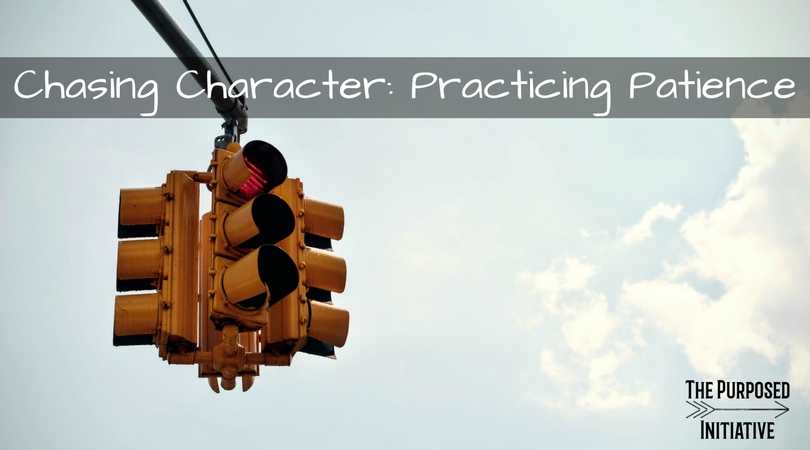 It’s funny how we all work differently. When it comes to writing a blog or an essay or even a letter, some people plan it out physically, they like to do dot points and flow charts and diagrams. Me, I tend to do most of the working out in my head. I tend to think it through, plan how I’m going to get started and what my main points will be, and then I’ll sit down and start typing. Occasionally I’ll write something down or do some dot points, but not very often. I tend to get a plan in my head then sit down and write it, quite often in one sitting, and then sit back and review (and get Emily to proof read) afterwards. So when it came to writing this blog, I thought I had it all worked out. I had my understanding of the subject, patience, and I had a rough idea where I was going to go with it. Then this afternoon I was looking up quotes to turn into a social media post and my ideas got thrown out the window. I found a quote which made me realise that my concept of patience was missing the point, that it was only half the story and that in order to truly have patience as part of my character I needed to get a bigger understanding of what it truly meant. So, new plan: we’re going to take a look at the quote I found and then unpack it with the story of a man named Joseph.
It’s funny how we all work differently. When it comes to writing a blog or an essay or even a letter, some people plan it out physically, they like to do dot points and flow charts and diagrams. Me, I tend to do most of the working out in my head. I tend to think it through, plan how I’m going to get started and what my main points will be, and then I’ll sit down and start typing. Occasionally I’ll write something down or do some dot points, but not very often. I tend to get a plan in my head then sit down and write it, quite often in one sitting, and then sit back and review (and get Emily to proof read) afterwards. So when it came to writing this blog, I thought I had it all worked out. I had my understanding of the subject, patience, and I had a rough idea where I was going to go with it. Then this afternoon I was looking up quotes to turn into a social media post and my ideas got thrown out the window. I found a quote which made me realise that my concept of patience was missing the point, that it was only half the story and that in order to truly have patience as part of my character I needed to get a bigger understanding of what it truly meant. So, new plan: we’re going to take a look at the quote I found and then unpack it with the story of a man named Joseph.
 The quote I found was by Joyce Meyer and this is what it says “Patience is not the ability to wait but the ability to keep a good attitude while waiting.” You see, I was all prepared to write a blog on the actions of patience, but I was skipping over the attitude. And when it comes to our character, it is our attitude that matters. Our attitude directs our actions which then demonstrate our character. To see this in action let’s take a look at a guy named Joseph. You’ve probably heard of Joseph, or at least of his technicoloured dream coat. Joseph’s story can be found in the Bible in the book of Genesis from chapter 37 through to chapter 50. We’re not going to go through the whole thing today, just a couple of key events in Joseph’s life where he demonstrated the character trait of patience.
The quote I found was by Joyce Meyer and this is what it says “Patience is not the ability to wait but the ability to keep a good attitude while waiting.” You see, I was all prepared to write a blog on the actions of patience, but I was skipping over the attitude. And when it comes to our character, it is our attitude that matters. Our attitude directs our actions which then demonstrate our character. To see this in action let’s take a look at a guy named Joseph. You’ve probably heard of Joseph, or at least of his technicoloured dream coat. Joseph’s story can be found in the Bible in the book of Genesis from chapter 37 through to chapter 50. We’re not going to go through the whole thing today, just a couple of key events in Joseph’s life where he demonstrated the character trait of patience.
Joseph was the youngest of a number of brothers, and he was his father’s favourite, which made his older brothers more than a little jealous. One day, when he was 17, he had a dream that one day he would rule over his brothers. Instead of keeping the vision to himself, Joseph went and told his brothers, who promptly threw him into a pit and then sold him into slavery. It would have been easy enough for Joseph to give up at this point, to think “well that dream’s never going to come true”. But i nstead of giving up and getting bitter, Joseph chooses to be patient and work diligently for his master, who responds by promoting him to first in command. Then one day, his master’s wife tried to get Joseph to sleep with her. Joseph refused and ran away, and in her anger she accused him of trying to rape her. Joseph was thrown into prison, and again it would have been easy to assume that his dream would amount to nothing. But again Joseph chose to remain patient, and again his attitude and approach stood out. He caught the eye of the prison warden who gave him responsibility for the other prisoners and for what happened in the prison. Whilst in the prison he met two of Pharaoh’s former servants who both had dreams that needed interpreting. It would have been understandable for him to stay well clear of this given where his dream had gotten him, but instead he interpreted the dreams for the men. One of the dreams was positive, the other not so much, but both of them came true. This action was the catalyst for Joseph later getting out of prison and eventually becoming second in command in Egypt.
nstead of giving up and getting bitter, Joseph chooses to be patient and work diligently for his master, who responds by promoting him to first in command. Then one day, his master’s wife tried to get Joseph to sleep with her. Joseph refused and ran away, and in her anger she accused him of trying to rape her. Joseph was thrown into prison, and again it would have been easy to assume that his dream would amount to nothing. But again Joseph chose to remain patient, and again his attitude and approach stood out. He caught the eye of the prison warden who gave him responsibility for the other prisoners and for what happened in the prison. Whilst in the prison he met two of Pharaoh’s former servants who both had dreams that needed interpreting. It would have been understandable for him to stay well clear of this given where his dream had gotten him, but instead he interpreted the dreams for the men. One of the dreams was positive, the other not so much, but both of them came true. This action was the catalyst for Joseph later getting out of prison and eventually becoming second in command in Egypt.
 Joseph showed patience in a situation where most of us would have given up, that in and of itself makes him someone who we can learn from. But it’s not just what he did that stands out, it’s how he did it. I don’t think anyone who reads this story would have questioned Joseph getting angry, or bitter or vengeful. But instead we see the patience that shines through his character through his actions. He chooses to remain positive in every situation he is in, and do his best to live in a way which has a positive impact on those around him. He chooses to wait and trust that things will work themselves out, and that the purpose placed on his life will come to pass when the time is right. By doing this we can see that his character stood out to those he came into contact with, and even though he started out in low positions (slave and prisoner) he was able to have a positive impact wherever he went.
Joseph showed patience in a situation where most of us would have given up, that in and of itself makes him someone who we can learn from. But it’s not just what he did that stands out, it’s how he did it. I don’t think anyone who reads this story would have questioned Joseph getting angry, or bitter or vengeful. But instead we see the patience that shines through his character through his actions. He chooses to remain positive in every situation he is in, and do his best to live in a way which has a positive impact on those around him. He chooses to wait and trust that things will work themselves out, and that the purpose placed on his life will come to pass when the time is right. By doing this we can see that his character stood out to those he came into contact with, and even though he started out in low positions (slave and prisoner) he was able to have a positive impact wherever he went.
 Joseph’s story may have happened a few thousand years ago, but there are things we can learn from it today. The more I reflect on his story, the more I realise that my understanding and concept of patience needs to grow. I look at my own life and I see the frustration and the questioning when things don’t happen as quickly as I think they should. When I think I’m on the right path but don’t arrive at my destination as quickly as I’d like I get impatient and start asking “why do I bother?” instead of “who can I help?” or “how can I get there faster?” instead of “what can I learn?”. Because maybe having patience as a character trait is less about the waiting itself and more about who we can help while we’re there. Maybe it’s less about the length of time and more about the lessons learned.
Joseph’s story may have happened a few thousand years ago, but there are things we can learn from it today. The more I reflect on his story, the more I realise that my understanding and concept of patience needs to grow. I look at my own life and I see the frustration and the questioning when things don’t happen as quickly as I think they should. When I think I’m on the right path but don’t arrive at my destination as quickly as I’d like I get impatient and start asking “why do I bother?” instead of “who can I help?” or “how can I get there faster?” instead of “what can I learn?”. Because maybe having patience as a character trait is less about the waiting itself and more about who we can help while we’re there. Maybe it’s less about the length of time and more about the lessons learned.
How are you with patience? Are you able to find the opportunities in times of waiting, or do you get crabby and just want to get there now? Do you look to make the most of the situation or just to find a shortcut? What can you do differently this week to take on an attitude of patience?


Recent Comments